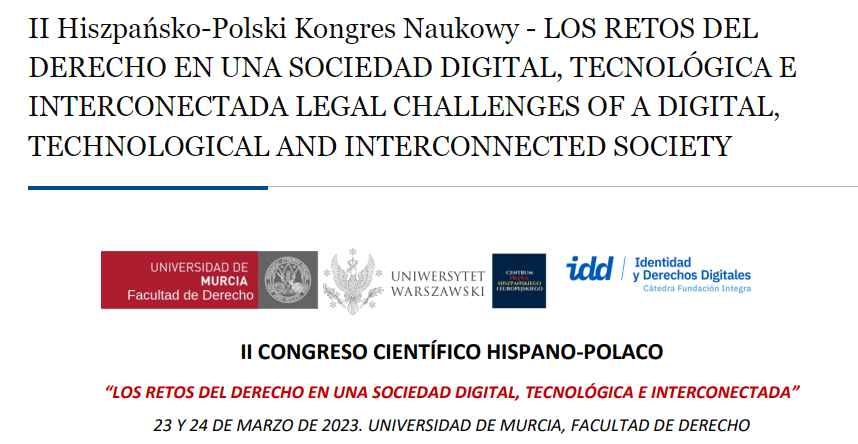
II Hiszpańsko-Polski Kongres Naukowy pt. „Los retos del derecho en una sociedad digital, tecnológica e interconectada – Legal Challenges of a Digital, Technological and Interconnected Society” organizowany przez Wydział Prawa Uniwersytetu w Murcji oraz Wydział Prawa i Administracji Uniwersytetu Warszawskiego odbędzie się w dniach 23-24 marca 2023 r. (czwartek – piątek) na Uniwersytecie w Murcji (Universidad de Murcia), trzecim najstarszym hiszpańskim uniwersytecie (założonym w 1272 r.).
Językiem konferencji będzie język angielski oraz hiszpański (tłumaczenie symultaniczne). Wydarzenie będzie miało charakter hybrydowy.
Informacje o konferencji – link
Link do połączenia (I dzień) – https://umurcia.zoom.us/j/93364238486
Link do połączenia (II dzień) – https://umurcia.zoom.us/j/99205322750
Drugiego dnia konferencji będę w ramach panelu „Technology supporting legal certainty: cybersecurity, identification and digital evidence” będę miał przyjemność wygłosić referat pt. Remote Court Hearings in Polish Judicial Civil Proceedings.
Main theses of the paper:
The COVID-19 epidemic seems to have brought permanent change to operational functions of justice in Poland. Temporary legal solutions established in an aftermath of the state of epidemic threat, later also state of epidemic emergency having been introduced in March 2020, have deemed it essential to redefine the clause of necessity, one of the gauges measuring the extent to which public agencies are authorised to restrict civic rights and freedoms. While on the one hand attempts had been made to preserve and provide citizens with actual access to justice, individual rights and capacity to use some public services had been limited on the other.
Notwithstanding the above, having met the demands of many years for the comprehensive implementation of online communication in civil proceedings, regulations enacted in connection with the epidemic ought to be viewed as positive. The introduced solution allows public hearings to be conducted with the use of technological appliances supporting remote proceedings with simultaneous and direct audio-video transmission, while not requiring any participants, including judicial panel members, to be present on court premises. The fact of the majority of citizens’ capacity for communicating with the use of privately owned electronic appliances (smartphones, tablets, laptops, desktop computers) was taken advantage of, such form of contact by and between parties to and participants of judicial proceedings and courts of law duly approved
It ought to be concluded that holding remote judicial sessions is an unquestioned expression of following the spirit of technical and technological progress. The observed prevalence of online trials making it possible for justices and parties to proceedings to participate therein without being physically present on court premises has indisputably become part of the overall image of judicial proceedings.